Table
ToggleRisks of Feeding Mushrooms to Rabbits
Feeding mushrooms to rabbits poses significant risks. Many mushrooms are toxic to rabbits and can cause severe health problems or even death. It’s challenging to identify safe mushrooms since some edible for humans might still be harmful to rabbits. Symptoms of mushroom poisoning include lethargy, loss of appetite, and digestive issues. Always err on the side of caution and avoid giving mushrooms to your rabbit.
Effects of Mushrooms on Rabbits
If a rabbit eats mushrooms, it could experience various negative effects, depending on the type and amount consumed. Common issues include digestive upset, such as stomach pain and changes in stool. In severe cases, mushrooms can cause toxic reactions, leading to symptoms like tremors, seizures, or liver damage. Immediate veterinary attention is crucial if you suspect your rabbit has eaten mushrooms.
Are Mushrooms Good for Rabbits?
Mushrooms are not suitable or beneficial for rabbits. While some mushrooms contain nutrients, they don’t offer anything that rabbits need for their diet. Rabbits thrive on a diet rich in hay, fresh vegetables, and a small amount of pellets. Sticking to these foods ensures your rabbit gets the necessary nutrients without the risks associated with mushrooms.
Nutritional Value of Mushrooms for Rabbits
Even though mushrooms have some nutritional value for humans, they don’t provide significant benefits for rabbits. Rabbits need a diet high in fibre and low in sugar and fat, which mushrooms don’t adequately provide. Instead, focus on feeding your rabbit fresh greens and vegetables that align with their dietary needs, promoting optimal health and well-being.

How Are Mushrooms Made?
Mushrooms are fungi that grow in various environments, often in dark, damp conditions. They reproduce through spores and grow on organic material like decaying wood or compost. Cultivated mushrooms are grown in controlled environments to ensure safety and quality, but even these are not recommended for rabbit consumption due to potential health risks.
What Types of Mushrooms Are Safe for Rabbits?
It’s generally best to avoid feeding any type of mushroom to your rabbit. While some mushrooms are safe for human consumption, they might still pose risks to rabbits. The digestive systems of rabbits are sensitive, and it’s difficult to ascertain which mushrooms might be safe. Therefore, it’s safer to stick to known rabbit-friendly foods and avoid mushrooms altogether.
Do Wild Rabbits Eat Mushrooms?
Wild rabbits may also once in a while nibble on mushrooms, but they normally avoid them because their instincts manual them to more secure meal selections. Wild rabbits normally eat grasses, leaves, and other plant cloth. The occasional ingestion of mushrooms in the wild doesn’t mean they may be secure; it just shows that wild rabbits have limited options and on occasion eat what’s available.
Why Is Eating Mushrooms Harmful to Rabbits?
Mushrooms can be harmful to rabbits because many contain toxins that their bodies can’t process. These toxins can lead to various health issues, including digestive upset, neurological problems, and organ failure. Additionally, identifying safe mushrooms is tricky, and the risk of poisoning is high. Thus, it’s best to avoid feeding mushrooms to rabbits to prevent any potential harm.
Store-bought mushrooms and Rabbits
Even shop-sold mushrooms, which are secure for human consumption, should no longer be given to rabbits. The protection of those mushrooms for humans would not expand to rabbits due to their special digestive systems. Instead of mushrooms, opt for store-bought veggies in particular acknowledged to be secure for rabbits, ensuring they get the vitamins they want without the threat.
How Often Can My Rabbit Eat Mushrooms?
Rabbits should not eat mushrooms at all. Feeding mushrooms, even occasionally, can pose health risks due to potential toxins and the inability of rabbits to digest them properly. Stick to a diet of hay, fresh vegetables, and occasional fruits to ensure your rabbit stays healthy and happy.
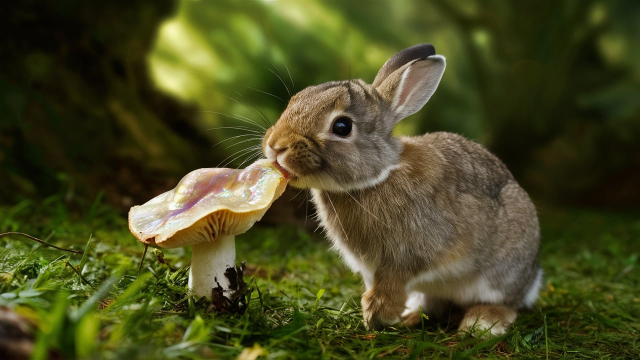
How Many Types of Mushrooms Are There?
There are thousands of mushroom species, with a wide variety of shapes, sizes, and colors. Some are edible, some are medicinal, and many are toxic. Because of the difficulty in identifying which mushrooms are safe for rabbits, it’s best to avoid feeding them any type of mushroom.
Observing Your Rabbit After Eating Mushrooms
If your rabbit accidentally eats mushrooms, closely monitor them for signs of distress. Symptoms of mushroom poisoning can include lethargy, loss of appetite, changes in stool, and tremors. If any of these symptoms appear, seek immediate veterinary care. Quick action can make a significant difference in your rabbit’s recovery.
What About Mushroom Seeds and Leaves?
Mushrooms don’t have seeds, but their spores are how they reproduce. The spores, like the mushrooms themselves, can also be harmful to rabbits. As for leaves, if you’re referring to other plants’ leaves, it’s crucial to ensure they’re safe for rabbits. Many common plants are toxic, so always double-check before feeding any plant material to your rabbit.
Tips for Serving Mushrooms to Bunnies
Since mushrooms are not safe for rabbits, you shouldn’t serve them at all. Instead, focus on providing a variety of safe, rabbit-friendly foods. Always wash vegetables thoroughly to remove pesticides and introduce new foods gradually. Monitor your rabbit for any adverse reactions when trying new foods to ensure they remain healthy.
How Does Mushroom Digestion Work in Rabbits?
Rabbits have a sensitive digestive system designed to process fibrous plant material. Mushrooms, lacking the necessary nutrients and fibre rabbits need, can disrupt their digestion. Feeding mushrooms can lead to digestive problems, making it essential to avoid them and stick to foods that support healthy digestion in rabbits.
What Are the Nutritional Benefits of Eating Mushrooms for Rabbits?
Mushrooms don’t offer any unique nutritional benefits for rabbits. While they might contain some vitamins and minerals, these are not particularly beneficial for rabbits compared to the nutrients found in hay and vegetables. Focusing on a balanced diet tailored to rabbit needs is crucial for their health and longevity.
Do Rabbits Enjoy Mushroom Food?
Rabbits might nibble on mushrooms out of curiosity, but this doesn’t mean they enjoy or should eat them. It’s essential to provide foods that are both safe and enjoyable for your rabbit. Rabbits typically enjoy fresh vegetables and leafy greens, which are much safer and healthier for them than mushrooms.
What Parts of Mushrooms Can Rabbits Eat?
No part of the mushroom is safe for rabbits to eat. Both the cap and the stem can contain harmful toxins that are dangerous to rabbits. Avoid giving your rabbit any part of a mushroom and stick to rabbit-safe foods that provide the necessary nutrients without any risk of toxicity.
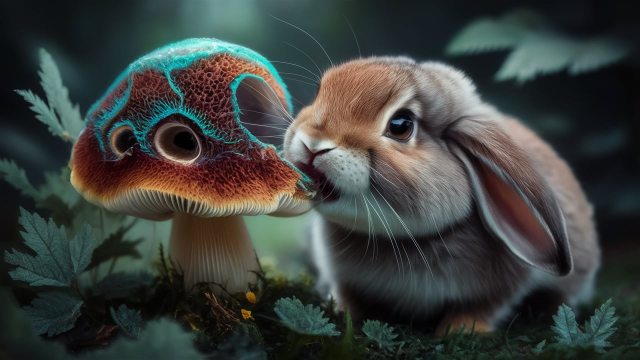
Can Rabbits Eat Mushroom Seeds?
Mushrooms don’t have seeds; they reproduce through spores. These spores can also be harmful to rabbits, just like the mushrooms themselves. To keep your rabbit safe, avoid giving them any part of a mushroom, including any spores that might be present.
Can Mushrooms Be Toxic to Rabbits?
Yes, mushrooms can be toxic to rabbits. Many mushrooms contain toxins that can cause severe health issues or even be fatal to rabbits. Because of the difficulty in identifying safe mushrooms and the high risk of toxicity, it’s best to avoid feeding mushrooms to your rabbit altogether.
Can Mushrooms Cause Digestive Problems in Rabbits?
Mushrooms can indeed cause digestive problems in rabbits. Their digestive systems are not equipped to handle mushrooms, leading to issues like stomach pain, changes in stool, and overall digestive upset. To prevent these problems, ensure your rabbit’s diet consists of safe, rabbit-friendly foods.
How Do You Introduce Your Bunny to Mushrooms?
You shouldn’t introduce your bunny to mushrooms at all due to the high risk of toxicity and digestive issues. Instead, introduce your rabbit to a variety of safe vegetables and greens slowly, watching for any adverse reactions. Always prioritize foods known to be safe for rabbits.
Preparing Mushrooms for Rabbits
Since mushrooms are unsafe for rabbits, you shouldn’t prepare them for rabbit consumption. Focus on preparing safe vegetables and greens instead. Wash them thoroughly, chop them into manageable pieces, and introduce new foods gradually to ensure your rabbit can digest them properly without any issues.
How Do Rabbits Eat Mushrooms?
While a rabbit might nibble on a mushroom out of curiosity, it’s crucial to prevent them from doing so due to the risk of toxicity. Always supervise your rabbit and keep mushrooms out of their reach. Provide plenty of safe, rabbit-friendly foods to satisfy their curiosity and nutritional needs.
What Happens If Rabbits Eat Too Many Mushrooms?
If a rabbit eats too many mushrooms, it can experience severe health issues, including toxicity symptoms like lethargy, loss of appetite, and tremors. In extreme cases, it can be fatal. Immediate veterinary attention is crucial if your rabbit consumes a significant amount of mushrooms to mitigate these risks.
 What If My Rabbit Eats a Large Amount of Mushrooms?
What If My Rabbit Eats a Large Amount of Mushrooms?
If your rabbit eats a large amount of mushrooms, seek immediate veterinary care. The toxins in mushrooms can cause rapid and severe health issues, and quick intervention is essential. Bring any remaining mushrooms with you to the vet to help them identify the type and provide appropriate treatment.
How Much Mushroom Can My Rabbit Eat?
Rabbits should not eat any amount of mushrooms. Even small amounts can pose risks due to potential toxins. Stick to a diet of hay, fresh vegetables, and occasional fruits to ensure your rabbit stays healthy and avoid any potential issues associated with mushroom consumption.
When Shouldn’t You Feed Mushrooms to Your Rabbit?
You should never feed mushrooms to your rabbit due to the risk of toxicity and digestive issues. Always prioritize foods that are known to be safe and beneficial for rabbits, avoiding any potential risks associated with mushrooms. This ensures your rabbit’s diet supports their overall health and well-being.
Can Baby Rabbits Eat Mushrooms?
Baby rabbits should never eat mushrooms. Their digestive systems are even more sensitive than adult rabbits, making them more susceptible to the harmful effects of mushrooms. Focus on providing a diet appropriate for their age, consisting mainly of hay, and freshwater, and eventually introducing safe vegetables as they grow.
How Frequently Should Adult and Baby Rabbits Be Fed Mushrooms?
Neither adult nor baby rabbits should be fed mushrooms at any frequency. Mushrooms pose significant health risks and offer no nutritional benefits for rabbits. Instead, maintain a diet rich in hay, fresh vegetables, and small amounts of pellets to ensure both adult and baby rabbits receive the nutrients they need.
Potential Dangers in Mushrooms?
Mushrooms can contain various toxins that are harmful to rabbits, leading to digestive upset, neurological issues, and even death. The difficulty in identifying safe mushrooms further increases the risk. To protect your rabbit, it’s best to avoid feeding them mushrooms altogether and focus on known safe foods.
What If My Rabbit Accidentally Eats a Lot of Mushrooms?
If your rabbit accidentally eats a lot of mushrooms, seek immediate veterinary care. The potential toxins in mushrooms can cause rapid and severe health issues. Early intervention is crucial in minimizing the effects and ensuring your rabbit receives the appropriate treatment to recover.
Monitoring Your Rabbit’s Health with Mushrooms?
Since mushrooms should not be part of your rabbit’s diet, you should monitor their health by providing a balanced diet of hay, fresh vegetables, and small amounts of pellets. If you suspect your rabbit has consumed mushrooms, watch for symptoms like lethargy, loss of appetite, and changes in stool, and seek veterinary care if necessary.
Incorporating Fresh Greens and Vegetables
Incorporate a variety of fresh greens and vegetables into your rabbit’s diet to provide essential nutrients. Options like romaine lettuce, kale, and parsley are great choices. Introduce new foods gradually and watch for any adverse reactions. A balanced diet with these foods promotes optimal health for your rabbit.
 What Actions Should I Take If My Rabbit Consumes Mushrooms?
What Actions Should I Take If My Rabbit Consumes Mushrooms?
If your rabbit consumes mushrooms, act quickly. Remove any remaining mushrooms from their reach and contact your veterinarian immediately. Provide details about the type and amount of mushrooms consumed, and follow the vet’s instructions closely. Quick action can make a significant difference in your rabbit’s health and recovery.
Creating a Balanced Diet With Mushrooms
A balanced diet for rabbits should not include mushrooms due to the risk of toxicity and digestive issues. Instead, focus on hay as the main component, supplemented with fresh vegetables and a small amount of pellets. This diet ensures your rabbit receives the necessary nutrients for good health without any risks.
My Rabbit Ate a Whole Mushroom?
If your rabbit ate a whole mushroom, seek immediate veterinary attention. Even a single mushroom can contain enough toxins to cause significant health problems. Quick intervention is crucial to assess the situation and provide the necessary treatment to mitigate any potential harm.
Can Rabbits Eat Wild Mushrooms?
Wild mushrooms are especially dangerous for rabbits due to the excessive probability of toxicity. It’s challenging to become aware of safe mushrooms inside the wild, and many are exceptionally toxic. Ensure your rabbit doesn’t have get right of entry to to regions where they might come across wild mushrooms to save you unintended ingestion.
What Else Can I Feed My Rabbit Besides Mushrooms?
There are many safe and healthy alternatives to mushrooms for your rabbit. Fresh vegetables like carrots, bell peppers, and leafy greens are excellent choices. Always introduce new foods gradually and monitor for any adverse reactions. A varied diet helps keep your rabbit healthy and satisfied.
How to Create a Rabbit-Friendly Garden?
To create a rabbit-friendly garden, plant a variety of safe vegetables and herbs such as parsley, basil, and leafy greens. Ensure the garden is free from toxic plants and chemicals. Providing a safe outdoor space with access to rabbit-friendly plants can enrich your rabbit’s environment and diet.
Mushroom Feeding Guidelines and Amounts?
Since mushrooms are dangerous for rabbits, there aren’t any feeding tips or quantities. Focus on feeding your rabbit a weight loss program on the whole consisting of hay, supplemented with fresh vegetables and small amounts of pellets. This guarantees they get hold of the necessary nutrients without the dangers associated with mushrooms.
Rabbit Treats Made at Home With Mushrooms?
Avoid using mushrooms in homemade rabbit treats due to their potential toxicity. Instead, use safe ingredients like oats, carrots, and apple slices. Homemade treats can be a healthy addition to your rabbit’s diet if made with appropriate, rabbit-safe ingredients.
Conclusion
In conclusion, mushrooms pose vast risks to rabbits and ought to be avoided. Instead, recognition on providing a balanced weight-reduction plan of hay, fresh veggies, and pellets to maintain your rabbit healthful and glad. By knowing the dangers and choosing safe options, you may ensure your bushy friend prospers.
FAQs
Can rabbits eat any type of mushroom?
No, rabbits should not eat any type of mushroom due to the risk of toxicity.
What should I do if my rabbit eats mushrooms?
Seek immediate veterinary care if your rabbit eats mushrooms.
Are store-bought mushrooms safe for rabbits?
No, even store-bought mushrooms are not safe for rabbits.
Can wild rabbits eat mushrooms?
Wild rabbits may occasionally nibble on mushrooms, but it is not recommended due to potential toxicity.
What are safe alternatives to mushrooms for rabbits?
Safe alternatives include leafy greens, carrots, and bell peppers.
Why are mushrooms harmful to rabbits?
Many mushrooms contain toxins that can cause severe health issues in rabbits.
Can baby rabbits eat mushrooms?
No, baby rabbits should not eat mushrooms due to their sensitive digestive systems.

Admin – Pet Expert shares valuable tips on pet care, nutrition, and health, offering practical advice to help your furry friends thrive.
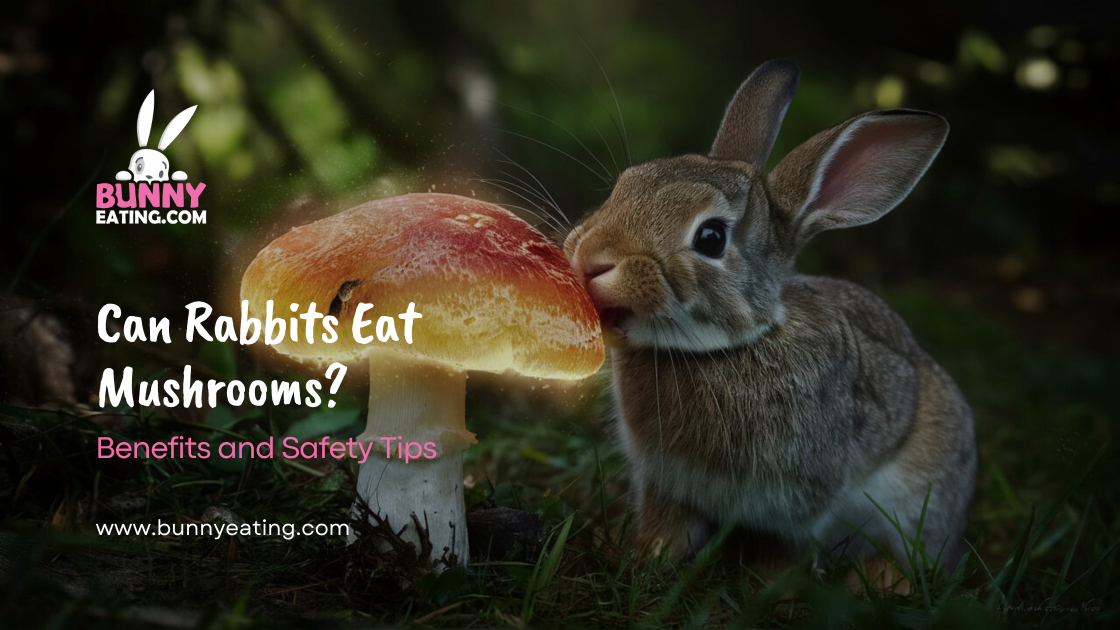
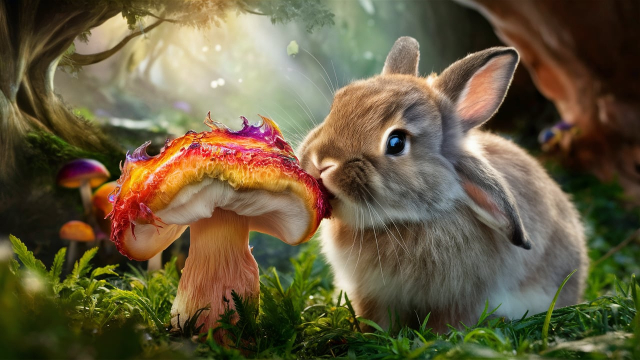 What If My Rabbit Eats a Large Amount of Mushrooms?
What If My Rabbit Eats a Large Amount of Mushrooms?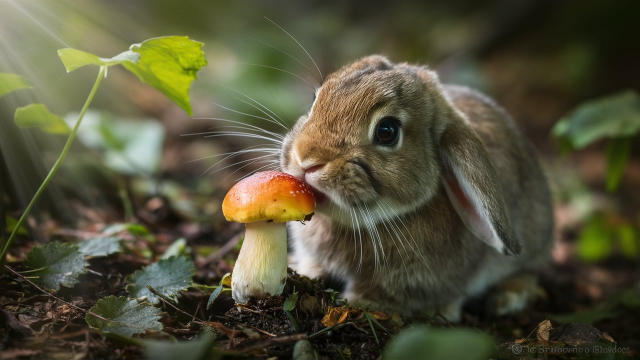 What Actions Should I Take If My Rabbit Consumes Mushrooms?
What Actions Should I Take If My Rabbit Consumes Mushrooms?









